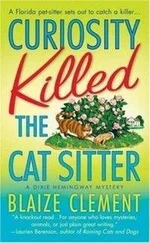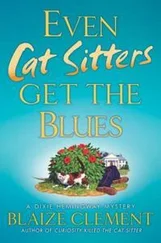“Why do you say that?”
“Well, he called me … I think his exact words were ‘pretty little thing’ and he made a comment about my ‘booty,’ but I snipped that in the bud right away.”
“And did you tell this Mr. Scotland your name?”
“I think I did. Why?”
She nodded. “So, you showed him which house was number 17, and then you went inside.”
“Yeah.”
Her gaze swept across the yard to the front door of Caroline’s house, and her eyes grew suddenly vacant.
I said, “What is it?”
She took a deep breath. “It doesn’t add up.”
“What?”
“Is there anyone upset with you?”
“Upset? With me?”
“Yes. Or anyone you can think of who might have reason to hurt you?”
I shook my head slowly. “No, but…”
Detective Carthage looked down at his feet, and just then I felt the hair on the back of my neck stand up. McKenzie flagged down another deputy.
She said, “As discreetly as possible, let’s get somebody on the house across the street.” Then she brought her hands together like she was closing a prayer book, and that tight smile reappeared on her lips.
She gestured toward Caroline’s front porch.
“Well,” she said. “Shall we?”
9
When I was a little girl, I found a baby bird.
Well, to put it more accurately, it found me. I was in the fifth grade. It was the end of the school year, right before summer break. I’d just gotten out of my last class of the day—Mrs. Bell’s Reading and Writing—and I was skipping down the hall minding my own business, making my way with the other kids to the circular driveway where all the school buses were lined up.
When I came out the double doors on the side of the building, I heard the eighth-grade girls’ choir practicing in the gymnasium, which doubled as the music room on alternate days after school. It was a separate structure, added some time in the fifties but made of the same sandy limestone blocks as the main building, connected by a long walkway covered with corrugated tin that was painted bright fire-hydrant red.
I knew I had at least another five or ten minutes before the buses took off, so I dropped my book bag down on the sidewalk and leaned against one of the metal poles to listen. I remember being shocked at how cold the metal felt against my neck, even though it must have been a hundred degrees out, and then something that looked vaguely like a ball of wet dryer lint fell at my feet with a plop .
I looked up.
At the top of the pole, where it met the awning overhead, was a metal bracket about two inches wide and six inches long. Tucked into its crook was a tiny bird’s nest made of matted twigs and pieces of string. To this day, I can still remember what the choir was singing—“Danny Boy”—and I can still hear their thin voices rising in unison as I looked down at the baby sparrow at my feet. It was lying flat on its back and staring up at me with terrified eyes …
But come ye back when summer’s in the meadow
Or when the valley’s hushed and white with snow
’Tis I’ll be here in sunshine or in shadow
Oh Danny boy, oh Danny boy, I love you so.
I knew right away I’d miss my bus, and I knew when I didn’t get off at my regular stop my grandmother would be worried sick, and I knew I’d get in trouble when she found out I’d missed it on purpose. But I also knew I couldn’t leave that poor bird alone. It was too young to fly, its feathers were just black downy fluff, and there was no way it could climb back into its nest.
If I’d had a crystal ball, I’d have known right then that Mrs. Bell would eventually come out and help me put him back and that he would in fact survive, but at the time I didn’t think there was much hope. The chances his mother would accept him after contact with a human being were slim to nothing. And, even worse, it was entirely possible she’d pushed him out of the nest herself to make room for the stronger chicks. I figured all I’d get for my trouble was a dead sparrow and a broken heart.
I know. It sounds awfully self-centered and morose for a ten-year-old girl, but in my defense, I’d had a bad year. My father had died nine months earlier in the line of duty. He was a fireman, just like my brother is today. He got trapped in a burning building—an old warehouse in downtown Sarasota that turned out to be a storage facility for an illegal cache of fireworks, although no one knew that until it was too late.
Our mom never fully recovered. Even before, it’s fair to say she wasn’t the most nurturing mother in the world, but our father’s death pushed her over the edge. Her drinking grew progressively worse, and not three months later she decided she was due for a little vacation from life, so she packed up a couple of suitcases, drove Michael and me to our grandparents’ place, and then disappeared off the face of the earth. I can count on one hand the number of times I’ve seen her since.
As I knelt down with a sigh and looked into the bird’s tiny black eyes, I was naive enough to think I’d already endured enough tragedy in my ten short years to last a lifetime.
I remember thinking, Why me?
* * *
I was walking along the edge of Caroline’s yard with Detective McKenzie and Detective Carthage following close behind, surrounded by flashing emergency lights and strings of police tape, and I’m ashamed to admit those very same words were lurking somewhere in the back of my mind. Why me ? There’d been a group of deputies talking quietly in the road when we walked over, but now they seemed to have stepped away into the background. In fact, the entire street had grown eerily quiet.
McKenzie said, “Dixie, if you can, try to remember the exact path you took when you arrived, and stay on it.”
Caroline’s driveway, like most of the houses on her street, isn’t poured concrete. It’s terra-cotta pavers, set at alternating angles to form a repeating starburst pattern, so as we turned toward the house, I counted the stars at my feet in a vain attempt to keep myself from flying into a panic.
I knew why McKenzie wanted me to follow the same path. She didn’t want me disturbing things any more than they already had been. There’s a term detectives use, mostly in private, for all the local deputies, police officers, and ambulance drivers that first arrive at a crime scene. It’s EMT. Short for “evidence mangling technician.” As EMTs move through the scene attending to victims, the likelihood that they’ll bring in foreign materials, either from clothing or equipment, is extraordinarily high. It’s just as likely they’ll take crucial evidence with them when they leave: a microscopic flake of skin stuck to the sole of a shoe or a tiny hair accidentally folded into a hospital sheet.
Every crime is like a puzzle, and the more serious the crime, the greater the number of potential pieces that can be scattered far and wide. In the case of a murder, every single surface—every blade of grass, every stone, every crack in the floorboards—can harbor a crucial secret. It might be a droplet of blood, a piece of dirt lodged in the carpet, or a tiny sliver of foil from a packet of chewing gum. It’s all held together as delicately as the winged seeds of a thistle, and just the slightest change in the air can send pieces floating off in every direction, never to be found again. That could mean the difference between solving the mystery of what happened and leaving a murderer to roam the streets.
When we got to the porch steps, I stayed to the right, not necessarily because I remembered how I’d gone before, but because I knew Charlie had been on his leash, and I always keep dogs to the left when I’m walking them. At the big picture window, McKenzie asked me to wait. She went over and stood in the open doorway as she pulled a pair of blue latex gloves out of her bag and slipped them on. There was a camera flash from inside the house.
Читать дальше












